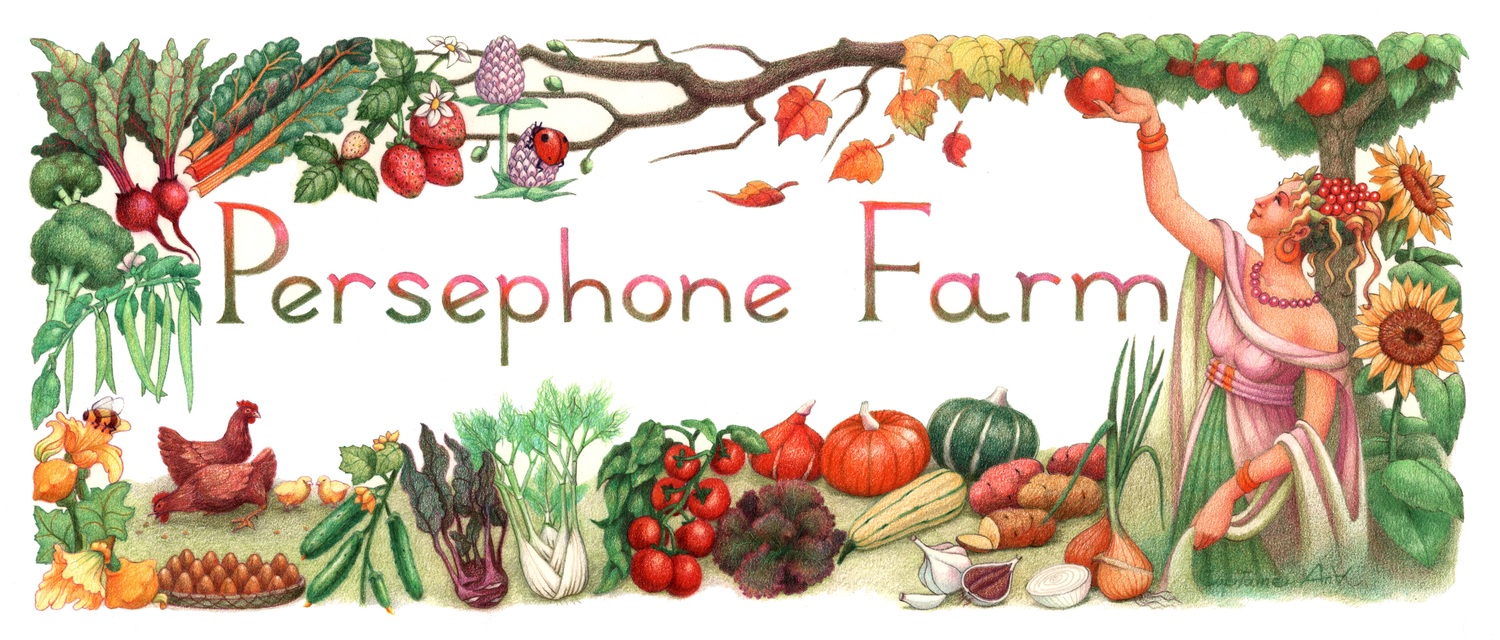Monday, 3 December, 2018
We woke this morning to a frosty 26 degrees here at Persephone Farm. There have been many nights in the twenties in the past month, but temperatures may dip even lower this week. If the forecast for Lebanon, a nearby town, is for the low twenties, it could fall into the upper teens here. In preparation, we have brought all the crops which keep well, like beets, cabbage, and celeriac, into storage for the winter. We've even brought some celery (which will surely be damaged beyond selling if it stays outside) into storage in hopes of trimming and salvaging some celery hearts for sale. The walk-in cooler is stuffed with vegetables and there are stacks of storage bins in the greenhouse and under cover in the shop.
Food central in the walk-in cooler.
Many greens and some vegetables remain in the fields: Arugula, Cabbages, Chard, Chervil, Cilantro, Collards, Escarole, Kale, Leeks, Mustards, Parsley, Radicchio, Sorrel, and Tat Soi. Depending on how cold it gets, the relative humidity, and how many consecutive nights of frost, they may or may not yield a marketable harvest this week. Experience from previous seasons tells us that leeks survive almost anything, and cabbages, chervil, collards, kale and sorrel will likely be fine at these temperatures. The leaves of the others may be damaged or killed outright, but the surviving roots will likely push out new leaves later in the winter. Plants are amazing.
In the meantime, it is hard to know what we can promise to deliver to accounts and bring to market this week. I make a list based on my best guess and try to follow up with timely communication when there are changes. The only certainty is that weather conditions and the resulting crop availability can change at any time. This may seem like an odd premise on which to base a business, and in fact many farmers these days seek to minimize such uncertainties by growing crops to fruition under protective structures such as greenhouses and high tunnels, or protective poly-fabrics such as row covers.
Why does Persephone Farm choose to raise crops outdoors, unprotected? Admittedly this is a strange choice to make from a business standpoint. To limit which crops we can produce and sell at what times of year, when we could be producing much more? What's the sense in that? It doesn't make a lot of sense in terms of our farm's bottom line; we earn less per acre than our season-extending farmer colleagues. While we are content with our earnings, we are not as well-placed to compete for labor recruitment, or in the marketplace.
We believe in the vibrant flavor of food grown outdoors. We believe in respecting what our farm, this place which has sustained us beautifully for thirty-three years, can do using its inherent natural resources. We believe in accepting natural limits as a reflection of our desire to conserve precious resources. We believe in attempting to limit the use of plastics and other petroleum products (sources of pollution, climate change, and armed conflict around the world) in agricultural production. We believe it is important to give back to this ecosystem which feeds us on so many levels. We wish to care for this land in a manner that can sustain food production for many years and welcome future generations of farmers.
Uncertainties can be cumbersome and confusing, but our commitment is always to work creatively within limits for the best-tasting produce, raised and handled with care for you. Thanks for coming along for the ride.
Ice in a pothole in the driveway.
Frosty morning.
